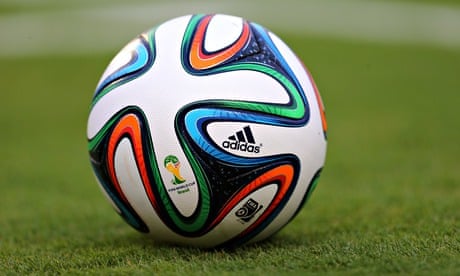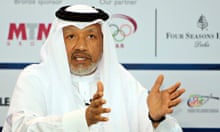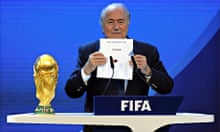Two more of Fifa's headline World Cup sponsors have warned that corruption allegations engulfing the award of the 2022 tournament to Qatar are damaging the global reputation of the game.
Visa and Adidas on Sunday joined Sony in demanding that the bribery claims be taken seriously by world football's governing body, on the day that England's footballers arrived in Brazil.
Adidas, which recently renewed its sponsorship until 2030 and is Fifa's longest serving partner, said: "The negative tenor of the public debate around Fifa at the moment is neither good for football nor for Fifa and its partners."
Visa, which insists that only its cards can be used at World Cup venues as part of its sponsorship deal, said it expected Fifa would "take the appropriate actions" to respond to the current investigation and its recommendations.
On Saturday, Sony had said it expected Fifa to ensure the disclosures are "investigated appropriately".
A spokesman for Coca-Cola said: "Anything that detracts from the mission and ideals of the Fifa World Cup is a concern to us, but we are confident that Fifa is taking these allegations very seriously and is investigating them thoroughly through the investigatory chamber of the Fifa ethics committee."
The sponsors spoke out following new revelations in the Sunday Times regarding the activities of Mohamed Bin Hammam, the Qatari former Fifa executive committee member – who was also formerly the Asian Football Confederation president – and his alleged links to the successful Qatar 2022 bid.
Collectively, all of Fifa's sponsors contribute $1.5bn (£900m) over a four-year World Cup cycle.
The commercial pressure will cause a new wave of concern among Fifa executives already dealing with the implications of a troubled buildup to the 2014 tournament in Brazil and a new wave of corruption allegations over the improbable award of the 2022 tournament to Qatar.
The Sunday Times reports, based on a cache of millions of documents detailing the activities of Bin Hammam in the runup to the vote in December 2010, outlined allegations that he used a $5m slush fund and his influence to pay bribes and coordinate global trade deals for the bid.
The Qatar 2022 organising committee insists that Bin Hammam, who quit football after an attempt to unseat Sepp Blatter as Fifa president was derailed by bribery allegations in 2011, had no "official or unofficial" role in winning the bid.
The World Cup in Brazil – which has had a troubled buildup domestically in the light of public anger over the $11bn spent on hosting it at a time of underinvestment in public services – has added another dimension to the bribery storm.
Meanwhile, amid continuing concern over the treatment of migrant workers building stadiums in Qatar, Fifa is also understood to be considering a plan to make a country's human rights record a factor in awarding future World Cups.
It is understood those responsible for drawing up the new rules are considering the plan in response to the global outcry that met reports from human rights groups and the Guardian about the conditions faced by migrant workers in the region.
Fifa delegates gathering in São Paulo before Tuesday's organisational congress insisted the current investigation by former New York attorney Michael Garcia would deal with the bribery claims.
Following a year-long investigation into how the 2018 and 2022 tournaments were won by Russia and Qatar, Garcia has promised to finish his work by Monday and hand the completed report to the adjudicatory chamber of Fifa's ethics committee by mid-July.
It emerged last week that Garcia had declined to examine the evidence obtained by the Sunday Times. Fifa sources said he had already seen the same material, but the newspaper believes he has only received a selection of the documents it has in its possession.
Blatter took to Twitter to declare that the governing body needed more time: "Never ignoring media reports on ethics allegations in football. But let the Ethics Committee work!"
The latest body blow to Fifa's reputation overshadowed last-minute preparations for the tournament as the 32 teams and their fans continued to arrive.
After England's players touched down in Rio de Janeiro, manager Roy Hodgson shrugged off the team's goalless draw against Honduras on Saturday.
"It doesn't mean anything," he said. "The team is in good shape. We are all united and anxious for the first match against Italy."
In Sao Paulo, where the buildup has been low-key amid conflicted emotions about Fifa and World Cup organisers, preparations continued for the home team's opening match against Croatia on Thursday. Despite widespread concern that the $300m Arena de São Paulo would not be ready in the wake of delays partly caused by the deaths of three construction workers, organisers insist that the remaining work is purely cosmetic.
A São Paulo court on Sunday ruled that an ongoing Metro strike, which caused violent clashes between protesters and police on Friday evening and threatened to disrupt the opening match, was illegal. Union leaders, who had claimed they would seek support for a general strike, said they would now proceed with it.
Inside the stadium, rehearsals continued for the pre-match formalities. Outside, families queued up in the sun to have their picture taken against the backdrop of the new stadium which will be used by club side Corinthians after the tournament once temporary stands at either end have been remodelled.
However, the situation at several of the 11 other stadiums is unclear, with critics warning that those in remote parts of Brazil with no major football teams will quickly become white elephants. The much criticised decision not to base the group stages in geographic clusters has also led to logistical concerns over the huge distances that will have to be covered by players and fans.




Comments (…)
Sign in or create your Guardian account to join the discussion